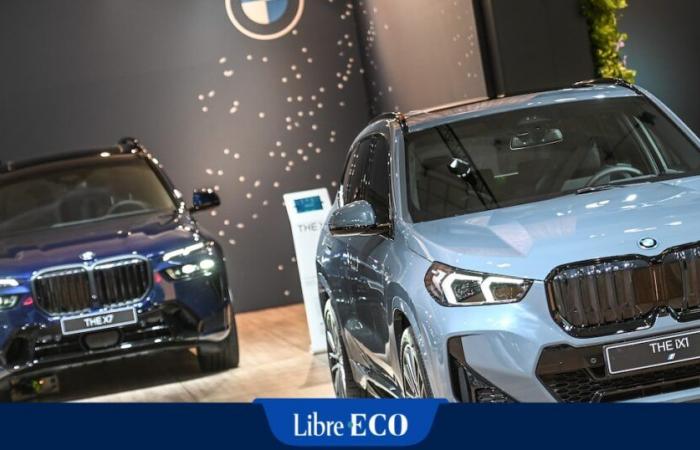The future host of the White House is once again suspected of wanting to put up barriers to slow down sales of premium and luxury cars manufactured in Europe. “I don’t want to see any more Mercedes on 5th Avenue in New York.”he would have declared to French President Emmanuel Macron in June 2018, according to diplomats’ indiscretions. He even went back a few months later, saying that these German cars were a “threat to the national security of the United States.
Tesla shaken up, the largest Chinese manufacturer overtakes it for the first time
He was not close to a verbal slip-up, especially since German manufacturers were very present in the United States. Most of their factories are in the southeastern United States. All the states where German factories are located, North Carolina, South Carolina, Georgia, Tennessee, Alabama and Michigan, had also voted for the champion of “America first” during the presidential election of November 2016.
Nearly one in two German cars sold in the United States was “made in the United States of America”. “If these cars suddenly pose a threat to the national security of the United States, then that’s a shock to us,” German Chancellor Angela Merkel then reacted. A “choc”, to remain diplomatically correct. German manufacturers had escaped a 35% surcharge thanks to the commitment to make new investments or increase local production.
Alas, when Donald Trump has a fixed idea, he dwells on it endlessly. German brands therefore remained in its crosshairs. Moreover, during an electoral visit to Detroit, the cradle of the American automobile industry, he did not fail to return to the charge, with all the excess which is his trademark.
“JI want German automakers to become American automakers.” he declared last September before the Economic Club of Detroit. “They’re sending their cars to us like we’re a bunch of idiots. BMW, Mercedes, Volkswagen, by the millions and millions and millions. We’re not going to get screwed anymore, okay? Now they’re going to have to play by our rules.” . This shows that the threat of a backlash is still very present from the 47th President of the United States.
Winners, finally?
Even if the Stellantis group is at first glance the most exposed with 47% of its overall sales made in the United States, according to Morningstar, this is not because it is flooding the American market with Citroën, Peugeot or even Opel. The reason is simply that Stellantis are also very American brands: Chrysler, Dodge, Jeep and RAM. Stellantis is therefore playing on velvet. Hence the good performance of the action on the Paris Stock Exchange (+ 1.82%), especially as tariff barriers could support sales of its American vehicles.
Carlos Tavares (Stellantis), the “cost samurai” and “performance psychopath”
It’s a different story for German manufacturers: sales in the United States represent 24% of the total for BMW, 23% for Mercedes and 21% for Volkswagen. “Not all cars sold by European automakers are made in Europe, and many companies that also produce vehicles in the United States would likely be exempt from tariffs. This somewhat limits the impact of customs duties on the automotive sector in general.estimates Morningstar in a post-election note.
During the presentation of the third quarter results – notably marked by a profit divided by six – the CEO of BMW was even relatively optimistic. For Oliver Zipse, the Bavarian brand BMW could even have “more benefits” what inconveniences if Donald Trump applied new customs tariffs”because we have a very, very large presence in the United States.”
200% taxes?
This includes the Spartanburg factory, the largest BMW plant in the world. It produced 410,793 vehicles last year, more than half of which were exported notably to Europe, which gives BMW sufficient room to sell more locally if customs duties were imposed on imports from of Europe.
Where it could hurt a lot, however, is the threat of imposing 200% customs duties on vehicles exported from Mexico to the United States by foreign manufacturers, who have of course chosen this country to lower labor cost.
What is Joe Biden’s economic record? The American economy is on the verge of a “soft landing”
However, VW, BMW and Audi also have factories in the immediate neighbor of the United States, with a good part of the production intended for the American market. Audi (VW group) will invest one billion euros in Mexico, in the state of Puebla, in an electric vehicle assembly plant. It is also in Mexico that the car promised to the Forest factory will be built in the future.






